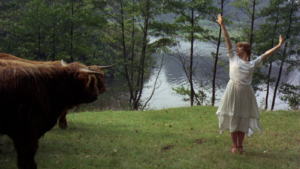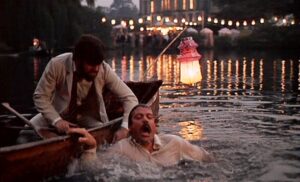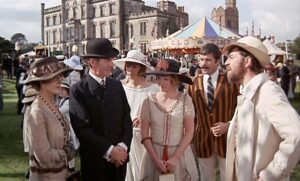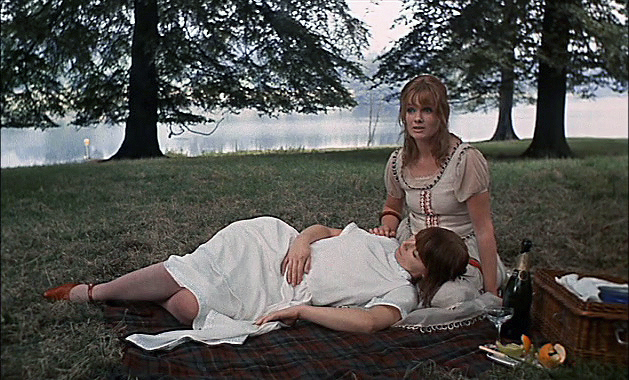“How lovely it is to be free,” said Ursula, running swiftly here and there between the tree trunks, quite naked, her hair blowing loose. The grove was of beech trees, big and splendid, a steel-grey scaffolding of trunks and boughs, with level sprays of intense green here and there, whilst through the northern side the distance glimmered open as through a window.” Later they picnic, drinking aromatic tea and eating little cucumber and caviar sandwiches. 
The picnic has a kind of momentary perfection. Ursula begins to sing in a high thin voice, and Gudrun begins to dance: “Ursula sat on the grass, her mouth open in her singing, her eyes laughing as if she thought it was a great joke, but a yellow light flashing up in them, as she caught some of the unconscious ritualistic suggestion of the complex shuddering and waving and drifting of her sister’s white form, that was clutched in pure, mindless, tossing rhythm, and a will set powerful in a kind of hypnotic influence.” When the sisters have attracted a herd of Highland cattle, Gudrun dances for the staring herd like a Cretan maiden dancing with the bulls.
The intensity is cut off when Gerald and Rupert appear. Restored to a more ordinary picnicky attitude, the couples pair off, and as the intimacy of each couple intensifies (though) there is no overt sexuality), disaster strikes. Gerald’s sister, Diana, has fallen off the paddle steamer, and a young doctor has jumped in to save her. In the darkness, neither is visible, and a panicked search begins. The magical light now seems garish. Gerald, repeatedly diving into the cold dark water, calls for the lanterns, but to no avail. When the lake is drained, the bodies are found locked in a grotesque loving embrace: Diana chocking the doctor. This image of death foreshadows what is to come to the couples. Rupert and Usual, who are empathic, console one another; Gudrun leaves without Gerald scheming how she should appear when he comes to her.
“The Water Party,” a euphemism for a picnic, is hosted by the Crich family, owners of the local coal mine. Theirs is a substantial estate with a large lake that supports a small steamer.
Featured Image: Ursula (Glenda Jackson) and Gudrun (Jenny Linden) are fully clothed at the picnic in Kurt Russel’s Women in Love.
See D.H. Lawrence. Women in Love. London: Martin Secker, 1920; Ken Russell. Women in Love (1969); Joyce Carol Oates. “Lawrence’s Götterdämmerung: The Apocalyptic Vision of Women in Love.” Critical Inquiry, no. Spring (1978)

